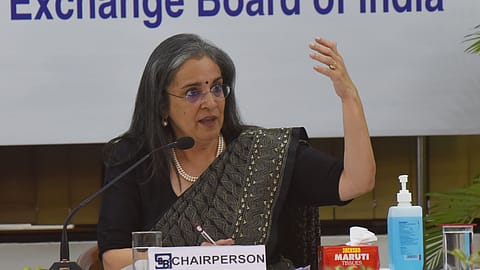SEBI to ease delisting norms in next board meeting: Madhabi Puri Buch
SEBI is not in a rush to regulate the market but is adopting a consultative approach, says SEBI chairperson.

The Securities and Exchange Board of India (SEBI) will review the delisting regulations and trading plan reforms in the market regulator's next board meeting in January, SEBI chairperson Madhabi Puri Buch says while addressing the 20th Annual Capital Markets Conference organised by the Federation of Indian Chambers of Commerce & Industry (FICCI).
"There was a popular belief that we would never review the delisting regulations and that we would stay with the reverse book-building process. A consultation paper is already floated and SEBI has received a lot of feedback. At the next board meeting, we are taking that proposal to our Board," Buch said.
The SEBI chairperson says that the regulator is not in a rush to regulate the market but is adopting a consultative approach towards regulation-making or amendments.
Continuing the theme of data-driven decision-making, Buch highlighted SEBI's initiatives in adopting a consultative approach towards regulation-making or amendments, now becoming a norm for SEBI's policy-making process.
Between 2003 and 2013, the percentage of consultation papers to the total circulars issued by SEBI was 7%. This means for every 100 circulars issued only seven were consultation papers. Over the next nine years, it went up to 17%. And over the last year, it further rose to 33%.
This approach has led to significant reforms in various areas, including insider trading policies, delisting regulations, and ESG metrics, according to Buch. The focus remains on ensuring that any new regulations are practical, implementable, and backed by comprehensive data, she says.
"If there is no trust in the system, there will be no business," the SEBI chairperson says, adding, "What is required is addressing the details so that there is ease of compliance." Buch cited examples like the Industry Standards for implementing SEBI regulations, which reflects a collaborative approach between regulators and market participants. She alluded to the Industry Standards Forum becoming a formal part of the regulatory architecture.
Recommended Stories
Buch pointed out significant progress and strategic initiatives SEBI undertook, emphasising India's commitment to enhancing capital formation and regulatory efficiency.
In her speech, Buch highlighted SEBI's fundamental role of capital formation in the economy and the need for efficient regulatory processes. She emphasised key reforms in processing applications swiftly and transparently, demonstrating India's commitment to minimising delays and eschewing "dogmas".
"The relationship between a regulator and market participants is not adversarial. FICCI has multiple interactions with Sebi and will continue to engage in a constructive manner to enhance ease of doing business without compromising on the bedrock principles of stakeholder protection and transparency leading to good governance," says Subhrakant Panda, president, FICCI.
Anish Shah, president-elect, FICCI and MD & CEO of Mahindra & Mahindra, underlined high standards of governance, vibrant capital markets, and efficiency as critical. He complimented Chairperson SEBI's efforts to establish the foundations of the social stock exchange. "In a capitalist society, we often lose sight of the fact that we need to drive inclusive growth and focus on the changes to enable movement of capital in a much more efficient way to causes that are important and will make a big difference for us," he says.
(INR CR)